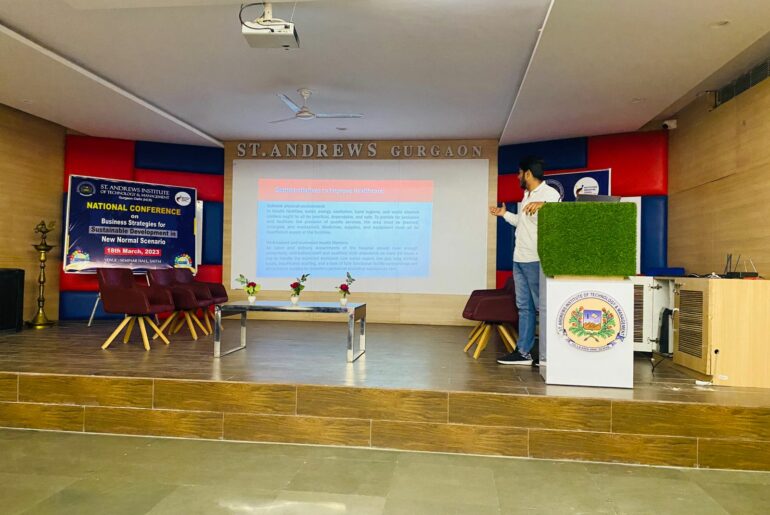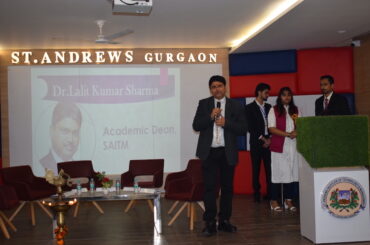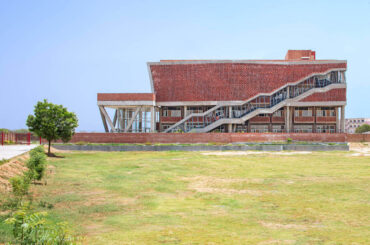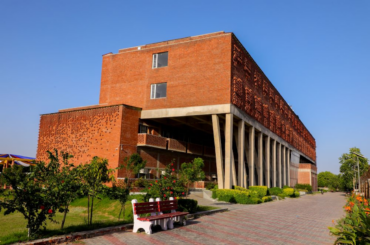Best MCA Colleges in India
The Master of Computer Applications (MCA) is a distinguished postgraduate degree in computer science and information technology. As the demand for IT professionals surges, enrolling in one of the best MCA colleges in India is crucial for students aiming to excel in this field.
India boasts several top-tier MCA colleges, renowned for their academic excellence, state-of-the-art infrastructure, and strong industry connections.
These institutions not only offer comprehensive theoretical knowledge but also provide practical exposure through internships, projects, and industry collaborations.
Graduates from these colleges are well-equipped to excel in various roles in the IT industry, ranging from software development to systems management.
Some of the most opted courses in India and St. Andrews college or different Engineering college or Management colleges are as follows:-
MCA Course Overview
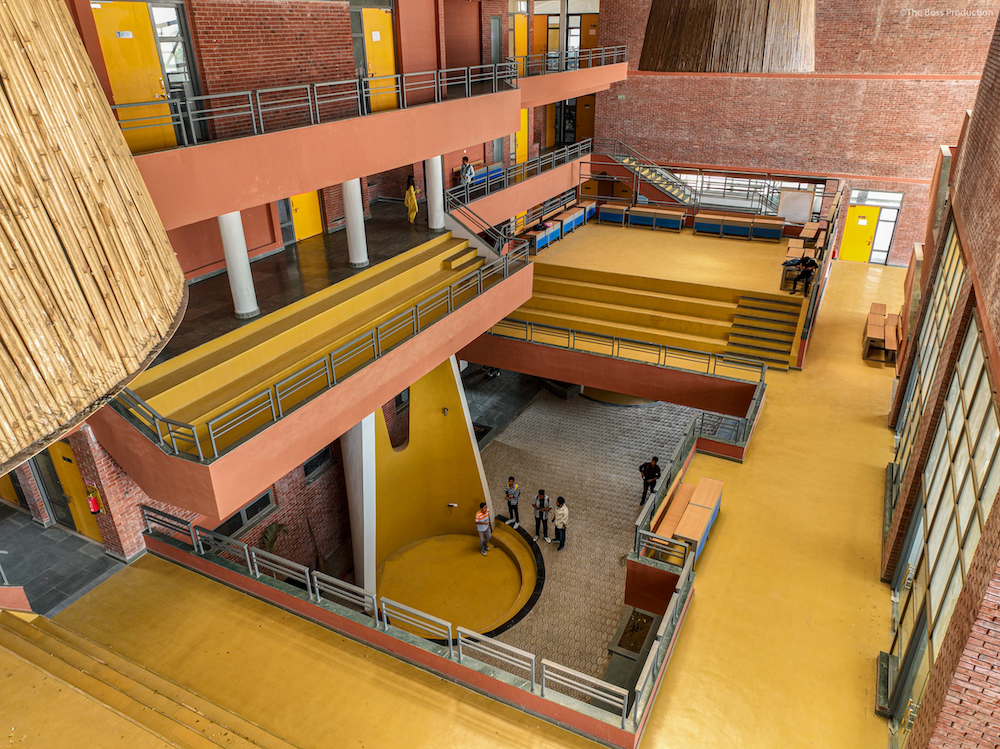
Master of Computer Applications (MCA) is a postgraduate degree focused on computer science and its applications. This course is designed to provide students with an in-depth understanding of the concepts and practices in computer technology, software development, and IT management.
Duration:
3 Years (6 semesters) for students with a B.Sc., BCA, or equivalent degree.
2 Years (4 semesters) for students with a B.Sc. in Computer Science or IT, or BCA (Lateral Entry).
Eligibility:
Bachelor’s Degree: A bachelor’s degree in any discipline with Mathematics as a subject at 10+2 level or at the undergraduate level.
Entrance Exams: Admission typically requires passing an entrance exam such as NIMCET, MAH MCA CET, or institutional-specific exams.
Core Subjects:
Programming Languages: Java, C++, Python
Database Management: SQL, Oracle, MongoDB
Software Engineering: Software Development Life Cycle (SDLC), Agile Methodologies
Web Technologies: HTML, CSS, JavaScript, PHP
Computer Networks: Networking principles, security, and protocols
Operating Systems: Linux, Windows, Unix
Data Structures and Algorithms
Artificial Intelligence and Machine Learning: Basics of AI, ML algorithms
Cloud Computing and Cybersecurity
Specializations:
Systems Management, Development and Engineering
Networking
Internet Working
Application Software
Software Development
Management Information Systems (MIS)
Skills Developed:
Technical Proficiency: In programming, database management, and software development.
Problem-Solving: Analytical thinking for designing and implementing software solutions.
Project Management: Managing software development projects efficiently.
Communication Skills: Essential for teamwork and client interaction.
Career Opportunities:
Software Developer
Systems Analyst
Database Administrator
Network Engineer
Web Developer
IT Consultant
Project Manager
Cybersecurity Expert
Future Prospects:
High Demand: The IT industry’s growth ensures a continuous demand for skilled professionals.
Advanced Roles: With experience, MCA graduates can advance to roles like Chief Technology Officer (CTO), IT Manager, and more.
MCA Course Eligibility Criteria
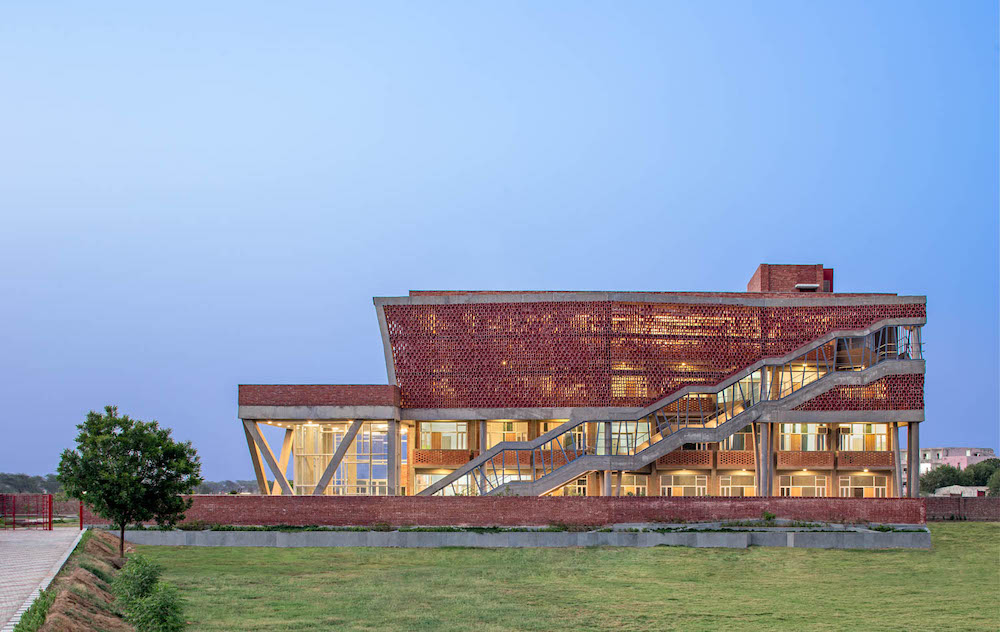
To pursue a Master of Computer Applications (MCA), candidates need to meet specific eligibility criteria, which generally include academic qualifications and entrance exam requirements.
1. Academic Qualifications:
Bachelor’s Degree:
A candidate must have a bachelor’s degree in any discipline (B.Sc., B.Com, B.A., etc.) from a recognized university.
The candidate must have studied Mathematics as a subject in either 10+2 (high school) or at the undergraduate level.
For Lateral Entry (2-Year MCA Program):
Candidates with a BCA, B.Sc. in Computer Science/Information Technology, or an equivalent degree are eligible for direct admission into the second year of the MCA course (lateral entry).
2. Minimum Percentage Requirement:
Most universities require a minimum aggregate score of 50-60% in the qualifying bachelor’s degree. Some institutions may have a different minimum percentage requirement, so it’s advisable to check the specific criteria for the university or college you are applying to.
3. Entrance Exams:
Admission to MCA programs is often based on performance in entrance exams. Some of the popular entrance exams include:
NIMCET: National Institute of Technology MCA Common Entrance Test.
MAH MCA CET: Maharashtra MCA Common Entrance Test.
JECA: Joint Entrance Examination for admission to MCA courses in West Bengal.
TANCET: Tamil Nadu Common Entrance Test for MCA admission in Tamil Nadu.
University-Specific Exams: Some universities like JNU, BHU, and Delhi University conduct their own entrance exams for MCA admission.
4. Reservation and Relaxation:
Candidates belonging to reserved categories (SC/ST/OBC) may receive relaxation in minimum percentage requirements as per government norms.
5. Work Experience (Optional):
While not mandatory, some universities may prefer candidates with relevant work experience in the IT field, especially for lateral entry into the MCA course.
Admission Process to MCA Colleges in India
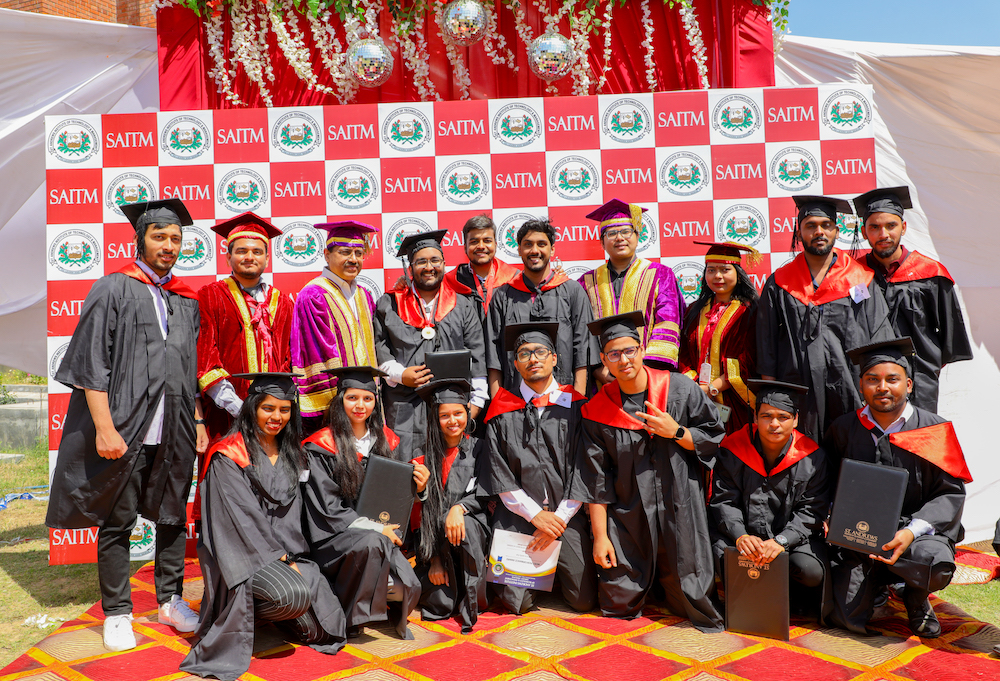
The admission process for Master of Computer Applications (MCA) course in India typically involves the following steps:
Meeting Eligibility Criteria:
Ensure you meet the academic qualifications and minimum percentage requirements.
Confirm eligibility for any entrance exams required by the colleges you’re interested in.
Entrance Exams:
Register and Appear for Entrance Exams: Most MCA course require candidates to take an entrance exam. Some of the popular entrance exams include:
NIMCET: Conducted by NITs for admission to their MCA programs.
MAH MCA CET: For MCA admissions in Maharashtra.
JECA: For MCA course in West Bengal.
TANCET: For MCA admissions in Tamil Nadu.
University-Specific Exams: Institutions like JNU, DU, BHU, etc., conduct their own entrance exams.
Exam Preparation: Study the syllabus, focus on subjects like mathematics, logical reasoning, computer awareness, and English language skills.
Result Declaration: After the entrance exam, results are announced, usually in the form of a rank or score.
Application Process:
Apply to Colleges: Based on your entrance exam scores, apply to the colleges offering MCA programs. Most applications are submitted online through the respective college or university’s official website.
Filling the Application Form: Provide details such as personal information, educational qualifications, entrance exam scores, and other required information.
Application Fee: Pay the application fee, which varies by institution.
Counseling and Seat Allotment:
Counseling Sessions: Candidates who qualify the entrance exam are called for counseling sessions. During counseling:
Choice Filling: Candidates choose their preferred colleges and specializations.
Document Verification: Candidates must present original documents for verification, including mark sheets, entrance exam scorecards, ID proofs, etc.
Seat Allotment: Based on rank, choice of college, and seat availability, candidates are allotted seats. Some institutions follow a centralized counseling process, while others may conduct it independently.
Admission Confirmation:
Accept the Seat: If allotted a seat, candidates must confirm their admission by paying the required fee within the stipulated time.
Provisional Admission Letter: On fee payment, a provisional admission letter is issued.
Final Admission:
Reporting to the College: Candidates must report to the respective college on the given date with all original documents and the admission letter.
Orientation and Commencement of Classes: Colleges usually conduct an orientation program before the start of the academic year.
Direct Admission (Management Quota):
Some private colleges offer direct admission to MCA programs under the management quota, which may not require an entrance exam. However, this often involves higher fees.
Types of MCA Courses
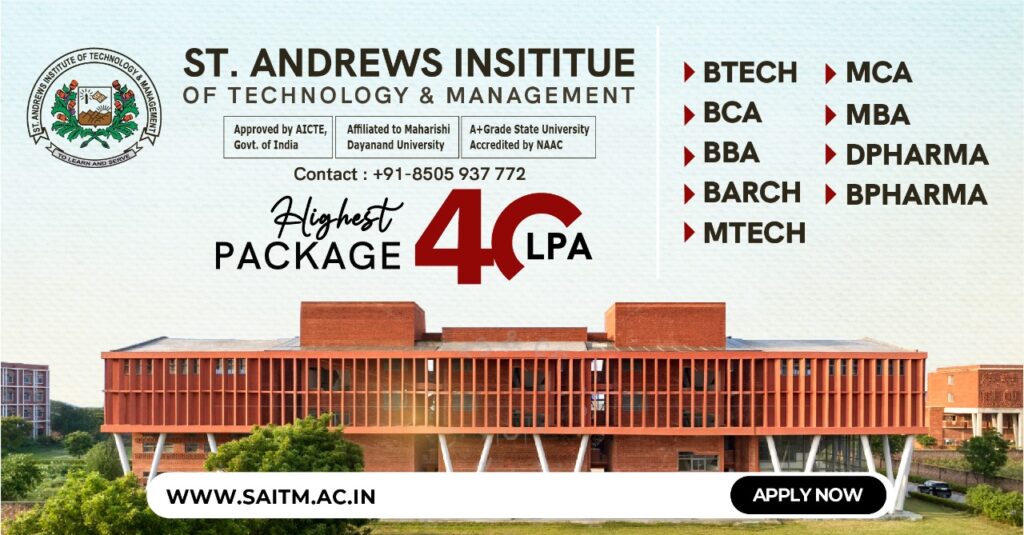
MCA (Master of Computer Applications) programs in India are designed to cater to different educational backgrounds and professional needs.
Here are the main types of MCA courses available:
Regular MCA (3-Year Program)
Duration: 3 years (6 semesters)
Overview: This is the most common form of MCA, designed for students who have completed a bachelor’s degree in any discipline with Mathematics as a subject. It covers a comprehensive curriculum that includes programming, software development, database management, and more.
Eligibility: A bachelor’s degree in any discipline with Mathematics at 10+2 or graduation level. Entrance exams are usually required.
Lateral Entry MCA (2-Year Program)
Duration: 2 years (4 semesters)
Overview: This program is meant for students who already have a bachelor’s degree in computer science or applications (e.g., BCA, B.Sc. in Computer Science/IT). The curriculum is more advanced and skips the foundational courses covered in the first year of the regular MCA.
Eligibility: A BCA or B.Sc. in Computer Science/IT degree. Entrance exams are often required, but the focus is on more advanced topics.
Integrated MCA (BCA + MCA)
Duration: 5 years (10 semesters)
Overview: This is a dual degree program that combines the BCA and MCA courses. It’s designed for students who want to pursue a comprehensive education in computer applications without a break between undergraduate and postgraduate studies.
Eligibility: Completion of 10+2 with Mathematics or Computer Science. Admission is generally through entrance exams or based on merit.
Online/Distance MCA
Duration: 3-5 years (flexible)
Overview: This course is designed for working professionals or students who cannot attend regular classes. It offers the flexibility to learn at your own pace through online classes, recorded lectures, and study materials.
Eligibility: Similar to the regular MCA, typically requiring a bachelor’s degree with Mathematics. Some institutions may have entrance exams or may offer admission based on merit.
Key Features: Flexibility in scheduling, self-paced learning, and suitability for those balancing work and study.
Executive MCA
Duration: 2-3 years (varies by institution)
Overview: The Executive MCA course is tailored for working professionals who have significant experience in the IT industry. The curriculum is focused on advanced topics and practical applications relevant to industry needs.
Eligibility: A bachelor’s degree with Mathematics and substantial work experience in the IT field. Admission may be based on entrance exams or work experience.
Key Features: Focus on industry-relevant skills, part-time or weekend classes, and often more project-oriented learning.
Dual Degree MCA
Duration: Typically 4-5 years
Overview: Some institutions offer a dual degree MCA course where students can earn two degrees simultaneously, such as B.Tech + MCA or B.Sc. + MCA. This approach saves time and provides a broader educational base.
Eligibility: Depending on the dual program structure, eligibility criteria may vary but generally includes 10+2 with Mathematics and qualifying in entrance exams.
Fees Structure of MCA Colleges in India
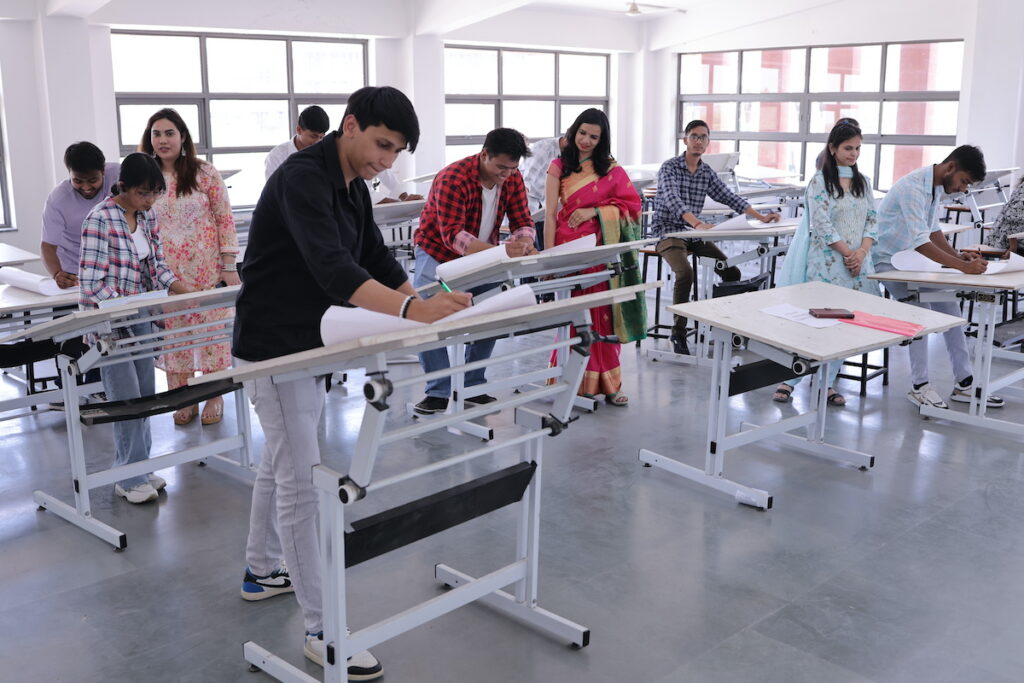
The fee structure for MCA course in India can vary significantly depending on the type of institution (government or private), location, and the facilities provided.
Below is an overview of the fee ranges for different types of MCA colleges in India:
Government Colleges
Fee Range: ₹20,000 – ₹1,50,000 per year
Example Colleges:
Jawaharlal Nehru University (JNU), New Delhi: Around ₹30,000 per year
University of Hyderabad (UoH), Hyderabad: Around ₹25,000 – ₹40,000 per year
St. Andrews Institute of Technology & Management (SAITM), Gurgaon: ₹78,500 per year
Delhi Technological University (DTU), Delhi: Approximately ₹1,50,000 per year
Overview: Government institutions usually have lower fees due to subsidies and funding. The quality of education is high, and these colleges often have a strong reputation and placement records.
National Institutes of Technology (NITs)
Fee Range: ₹70,000 – ₹1,50,000 per year
Example Colleges:
NIT Trichy: Approximately ₹1,00,000 per year
Overview: NITs are among the top institutions for MCA, with moderate fee structures compared to private colleges. They offer excellent academic and placement opportunities.
Private Colleges
Fee Range: ₹70,000 – ₹3,00,000 per year
Example Colleges:
St. Andrews Institute of Technology & Management (SAITM), Gurgaon: ₹78,500 per year
Vellore Institute of Technology (VIT), Vellore: Approximately ₹1,50,000 – ₹2,00,000 per year
Christ University, Bangalore: Around ₹1,20,000 – ₹1,50,000 per year
Overview: Private colleges typically have higher fees but offer modern infrastructure, industry connections, and good placement support.
Deemed Universities
Fee Range: ₹1,50,000 – ₹4,00,000 per year
Overview: Deemed universities often have higher fees due to extensive facilities, research opportunities, and global collaborations.
Distance/Online MCA
Fee Range: ₹20,000 – ₹1,00,000 per year
Example Colleges:
Indira Gandhi National Open University (IGNOU): Approximately ₹20,000 per year
Annamalai University, Tamil Nadu: Around ₹25,000 – ₹30,000 per year
Overview: Distance or online MCA course offer flexibility and are more affordable. They are suitable for working professionals who cannot attend regular classes.
Institutes Offering Management Quota Seats
Fee Range: ₹2,00,000 – ₹5,00,000 per year
Overview: Some private institutions offer admission through management quotas, which typically have higher fees. This route might bypass entrance exam requirements, but the cost is substantially higher.
Additional Costs
Hostel and Accommodation: ₹50,000 – ₹1,00,000 per year depending on the location and facilities.
Books and Study Materials: ₹10,000 – ₹20,000 per year.
Miscellaneous Fees: Examination fees, lab fees, and other incidental expenses.
Factors Influencing Fees of MCA Colleges in India
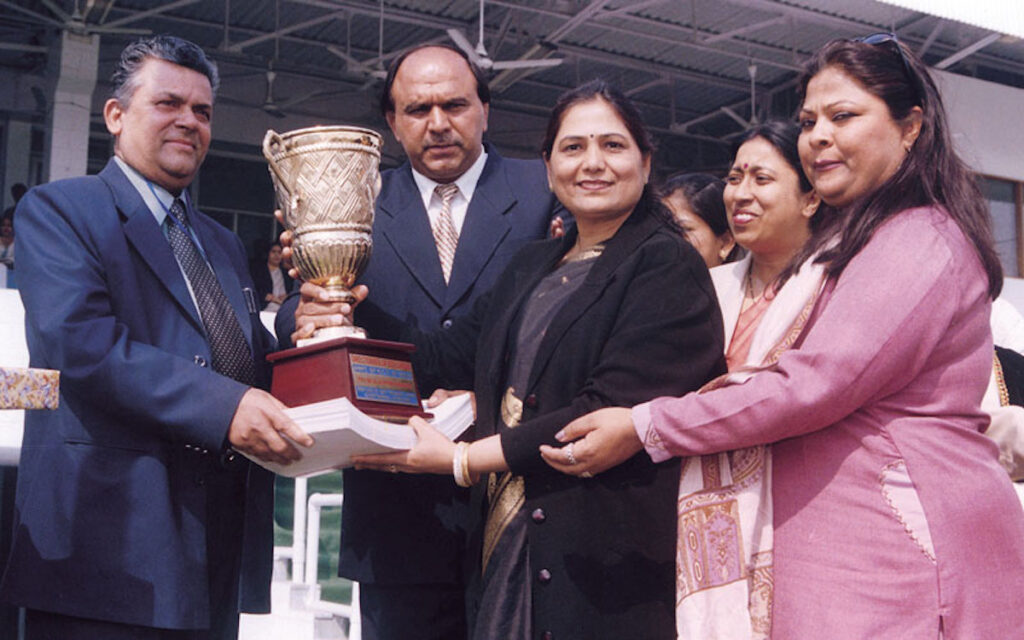
The fees structure for MCA Course can vary significantly among MCA colleges in India.
Several factors influence the cost of studying at these MCA Colleges in India:
Institution Type
Government vs. Private: Government MCA colleges in India generally have lower fees due to government funding and subsidies. Private colleges, which rely on student fees for funding, often charge higher tuition.
Deemed Universities vs. Private Universities: Deemed-to-be universities and private universities may have higher fees compared to traditional government-funded institutions.
Reputation and Ranking
MCA Colleges Ranking: Higher-ranked and more prestigious colleges typically charge higher fees due to their strong academic reputation and better facilities.
Institutional Prestige: Colleges with a strong reputation for quality education, faculty, and placements often have higher fees.
Location
Urban vs. Rural: MCA Colleges in India located in metropolitan cities or urban areas usually have higher fees due to higher living and operational costs compared to those in rural or less developed areas.
Regional Cost Variations: Fees can vary based on regional economic conditions and cost of living in different states.
Infrastructure and Facilities:
Campus Facilities: MCA Colleges in India with state-of-the-art infrastructure, modern laboratories, advanced technology, and extensive libraries may have higher fees to cover these facilities.
Hostel and Accommodation: Institutions offering on-campus accommodation, hostels, and other amenities may charge additional fees for these facilities.
Faculty and Teaching Quality
Expert Faculty: Colleges that employ experienced and highly qualified faculty members may charge higher fees to cover the costs of attracting and retaining top educators.
Student-Faculty Ratio: A lower student-faculty ratio often means higher fees due to the increased resources required to maintain personalized attention.
Course Duration and Specializations
Program Duration: Programs with extended durations or additional semesters may have higher fees.
Specializations: Colleges offering specialized or advanced courses within the MCA course may charge extra fees for these focused areas.
Research and Development
Research Facilities: Institutions that emphasize research and development, and provide research facilities or projects, may charge higher fees to support these initiatives.
Scholarships and Financial Aid
Availability of Financial Aid: MCA Colleges in India offering extensive scholarships, grants, or financial aid might have varied fee structures to accommodate different financial needs.
Scholarship Opportunities: MCA Colleges in India with competitive scholarships may have higher fees but provide opportunities for fee waivers or reductions based on merit.
Extracurricular Activities
Campus Life: MCA Colleges in India with extensive extracurricular programs, including clubs, sports, and cultural activities, might have higher fees to support these activities.
Administration and Operational Costs
Operational Costs: Fees may also reflect the administrative and operational costs of running the institution, including maintenance, staff salaries, and other expenses.
Top MCA Colleges in India
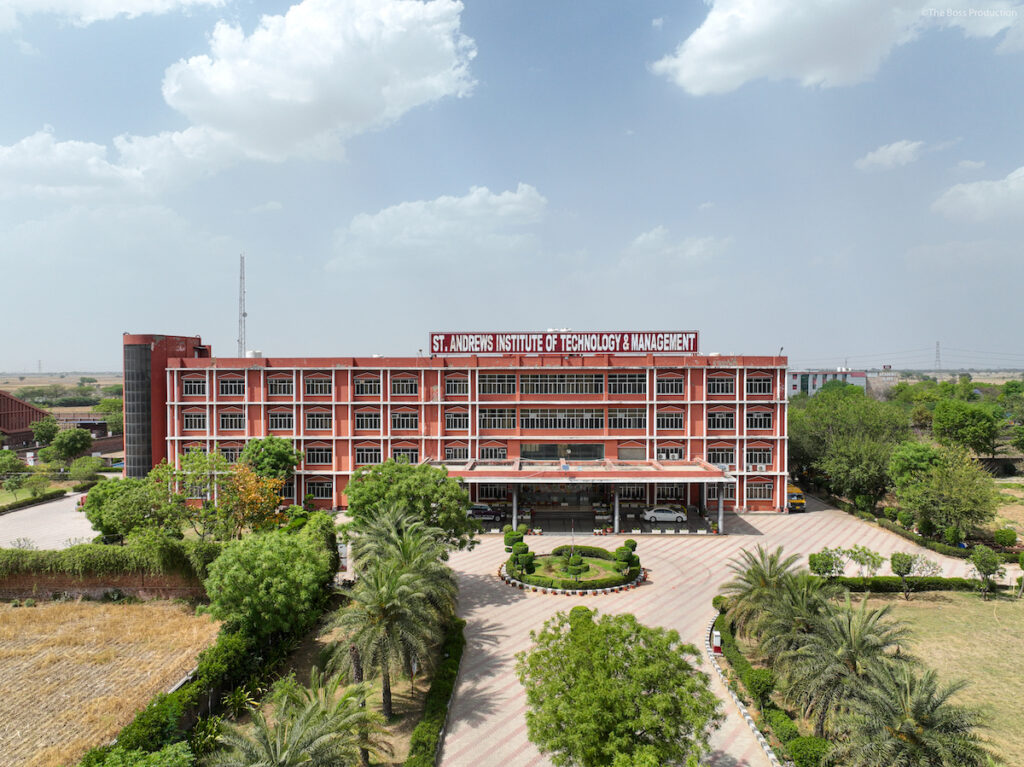
Here’s a brief introduction to some of the top MCA colleges in India:
Jawaharlal Nehru University (JNU), New Delhi
Overview: JNU is one of India’s premier institutions, known for its strong academic focus and research-driven approach in various disciplines, including computer applications.
Key Highlights: Offers a rigorous MCA course with a strong emphasis on computational theory, practical applications, and research.
St. Andrews Institute of Technology & Management (SAITM), Gurgaon
Overview: SAITM offers a well-rounded MCA program, providing a solid foundation in computer applications along with practical exposure to industry standards.
Key Highlights: Emphasis on practical skills, industry-relevant curriculum, and good placement support.
National Institute of Technology (NIT), Trichy
Overview: NIT Trichy is a top engineering and technology institution in India, offering a robust MCA course with state-of-the-art facilities and a research-oriented curriculum.
Key Highlights: High placement records, strong industry connections, and a vibrant campus life.
University of Hyderabad (UoH), Hyderabad
Overview: The University of Hyderabad is known for its excellent faculty, research output, and a well-structured MCA course that blends theory with practical applications.
Key Highlights: Focuses on advanced computing technologies, strong placement opportunities, and extensive research initiatives.
Delhi Technological University (DTU), Delhi
Overview: DTU, formerly known as Delhi College of Engineering, is one of the leading engineering institutions in India, offering an MCA course that is highly regarded for its academic rigor.
Key Highlights: High placement rates, strong industry linkages, and a focus on innovation and entrepreneurship.
Banaras Hindu University (BHU), Varanasi
Overview: BHU is a prestigious university with a long-standing reputation for excellence in education, offering a comprehensive MCA program.
Key Highlights: Strong focus on research, experienced faculty, and a vibrant academic environment.
Christ University, Bangalore
Overview: Christ University is a leading private university in India, known for its quality education and comprehensive MCA program.
Key Highlights: Industry-oriented curriculum, strong placement cell, and diverse student community.
University of Pune (Savitribai Phule Pune University), Pune
Overview: The University of Pune is one of India’s oldest and most prestigious universities, offering a well-regarded MCA program.
Key Highlights: Strong emphasis on research, extensive alumni network, and good placement opportunities.
Vellore Institute of Technology (VIT), Vellore
Overview: VIT is a top private university in India, offering a highly sought-after MCA course with a focus on cutting-edge technologies and industry partnerships.
Key Highlights: High placement rates, modern infrastructure, and a focus on innovation.
PES University, Bangalore
Overview: PES University is known for its strong academic programs and research initiatives, offering an MCA program that combines theoretical knowledge with practical skills.
Key Highlights: Strong industry ties, excellent placement opportunities, and a dynamic campus life.
Top MCA Colleges in India Location Wise

Here’s a list of some of the top MCA colleges in India, categorized by their locations:
Delhi/NCR
Jawaharlal Nehru University (JNU), New Delhi
Overview: Prestigious government institution known for its strong academic environment.
Location: New Delhi
Delhi Technological University (DTU), Delhi
Overview: Renowned for technical education and excellent placement opportunities.
Location: New Delhi
St. Andrews Institute of Technology & Management (SAITM), Gurgaon
Overview: Private institution offering industry-oriented MCA course with good placement support.
Location: Gurgaon, Haryana
Maharashtra
University of Pune (Savitribai Phule Pune University), Pune
Overview: Highly reputed for its comprehensive curriculum and research facilities.
Location: Pune, Maharashtra
Mumbai University, Mumbai
Overview: One of the oldest universities, offering a well-rounded MCA program.
Location: Mumbai, Maharashtra
Karnataka
Christ University, Bangalore
Overview: Well-known for its academic excellence and industry connections.
Location: Bangalore, Karnataka
RV College of Engineering (RVCE), Bangalore
Overview: Offers strong placement support and a vibrant campus environment.
Location: Bangalore, Karnataka
Bangalore University, Bangalore
Overview: Offers a robust curriculum with a strong emphasis on research.
Location: Bangalore, Karnataka
Tamil Nadu
Anna University, Chennai
Overview: Known for its technical education and extensive research programs.
Location: Chennai, Tamil Nadu
Vellore Institute of Technology (VIT), Vellore
Overview: Highly ranked private institution with a strong focus on technology and innovation.
Location: Vellore, Tamil Nadu
West Bengal
Jadavpur University, Kolkata
Overview: Renowned for its rigorous academic programs and research excellence.
Location: Kolkata, West Bengal
University of Calcutta, Kolkata
Overview: Offers a historic and respected MCA program with strong academic foundations.
Location: Kolkata, West Bengal
Bengal Institute of Technology (BIT), Kolkata
Overview: Known for its innovative teaching methods and good placement record.
Location: Kolkata, West Bengal
Andhra Pradesh/Telangana
University of Hyderabad (UoH), Hyderabad
Overview: A premier university known for its research and academic excellence.
Location: Hyderabad, Telangana
Osmania University, Hyderabad
Overview: Offers a well-established MCA program with strong industry ties.
Location: Hyderabad, Telangana
Jawaharlal Nehru Technological University (JNTU), Hyderabad
Overview: Known for its technological education and state-of-the-art facilities.
Location: Hyderabad, Telangana
Uttar Pradesh
Banaras Hindu University (BHU), Varanasi
Overview: One of India’s oldest and most prestigious universities with a strong MCA program.
Location: Varanasi, Uttar Pradesh
Aligarh Muslim University (AMU), Aligarh
Overview: Renowned for its academic rigor and comprehensive MCA curriculum.
Location: Aligarh, Uttar Pradesh
Motilal Nehru National Institute of Technology (MNNIT), Allahabad
Overview: NIT offering strong placement support and a well-rounded education.
Location: Allahabad, Uttar Pradesh
Madhya Pradesh
Maulana Azad National Institute of Technology (MANIT), Bhopal
Overview: NIT offering high-quality technological education with strong industry links.
Location: Bhopal, Madhya Pradesh
Devi Ahilya Vishwavidyalaya, Indore
Overview: Known for its comprehensive MCA program and research opportunities.
Location: Indore, Madhya Pradesh
Institute of Management Studies (IMS), Indore
Overview: Offers a well-rounded MCA program with strong emphasis on management skills.
Location: Indore, Madhya Pradesh
Top Government MCA Colleges in India
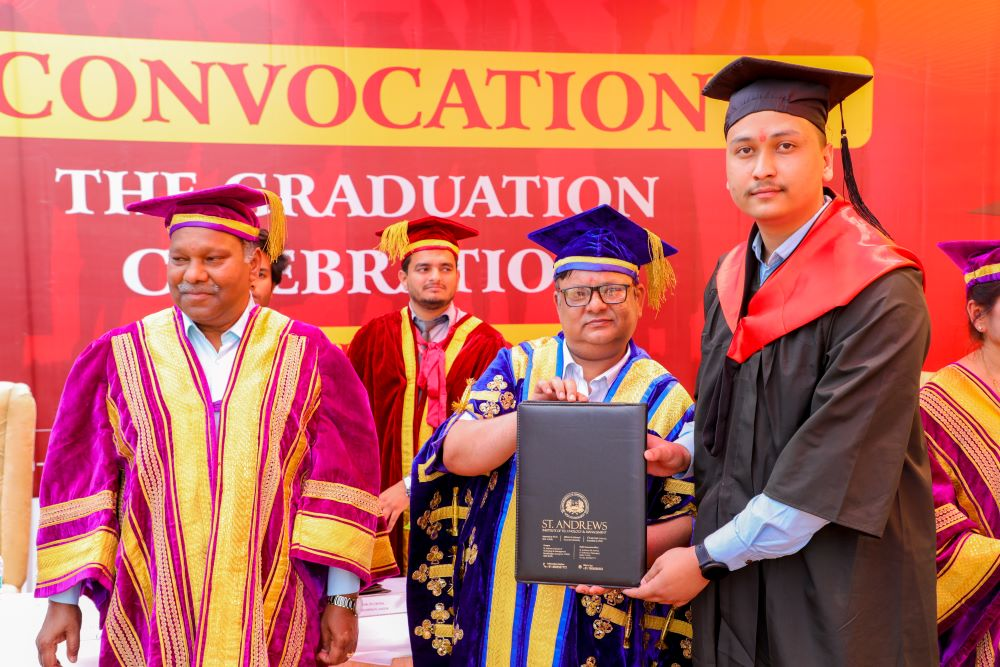
Here is a list of some of the top government MCA colleges in India offering MCA course:
Jawaharlal Nehru University (JNU), New Delhi:
Overview: JNU is one of the most prestigious universities in India, known for its rigorous academic programs and research opportunities.
Key Highlights: Affordable fees, strong faculty, excellent placement record, and vibrant campus life.
Location: New Delhi
Delhi Technological University (DTU), Delhi:
Overview: DTU is a leading technical university with a strong focus on research and innovation in computer science and applications.
Key Highlights: High placement rates, industry collaborations, and state-of-the-art infrastructure.
Location: New Delhi
St. Andrews Institute of Technology and Management (SAITM), Gurgaon
Overview: SAITM is known for its excellent academic standards, research facilities, and diverse student community.
Key Highlights: Strong research culture, affordable fees, and good industry connections.
Location: Gurgaon, Haryana
National Institutes of Technology (NITs):
Overview: NITs are among the top engineering institutions in India, offering high-quality MCA course with strong placement support.
Key Highlights: Strong alumni network, competitive entrance exams (NIMCET), and modern infrastructure.
Locations: Multiple locations including NIT Trichy, NIT Surathkal, NIT Warangal, and others.
Banaras Hindu University (BHU), Varanasi:
Overview: BHU is one of the oldest and most respected universities in India, offering a robust MCA with a strong academic curriculum.
Key Highlights: Affordable fees, historic campus, and strong placement support.
Location: Varanasi, Uttar Pradesh
Jadavpur University, Kolkata
Overview: Jadavpur University is highly regarded for its engineering and computer science programs, with a strong focus on research and innovation.
Key Highlights: High academic standards, affordable fees, and good placement opportunities.
Location: Kolkata, West Bengal
University of Pune (Savitribai Phule Pune University), Pune:
Overview: Pune University is well-known for its comprehensive MCA curriculum and research-driven approach.
Key Highlights: Strong faculty, industry-oriented curriculum, and good placement record.
Location: Pune, Maharashtra
Anna University, Chennai
Overview: Anna University is a premier technical university in Tamil Nadu, offering a well-structured MCA with a strong emphasis on practical skills.
Key Highlights: Strong industry ties, modern infrastructure, and excellent placement support.
Location: Chennai, Tamil Nadu
Aligarh Muslim University (AMU), Aligarh
Overview: AMU is a historic university known for its academic rigor and diverse academic programs, including MCA.
Key Highlights: Affordable fees, rich campus culture, and good placement opportunities.
Location: Aligarh, Uttar Pradesh
University of Calcutta, Kolkata
Overview: The University of Calcutta offers a well-rounded MCA degree with a strong emphasis on theoretical and practical knowledge.
Key Highlights: Historic university, strong academic reputation, and good placement support.
Location: Kolkata, West Bengal
Top Private MCA Colleges in India
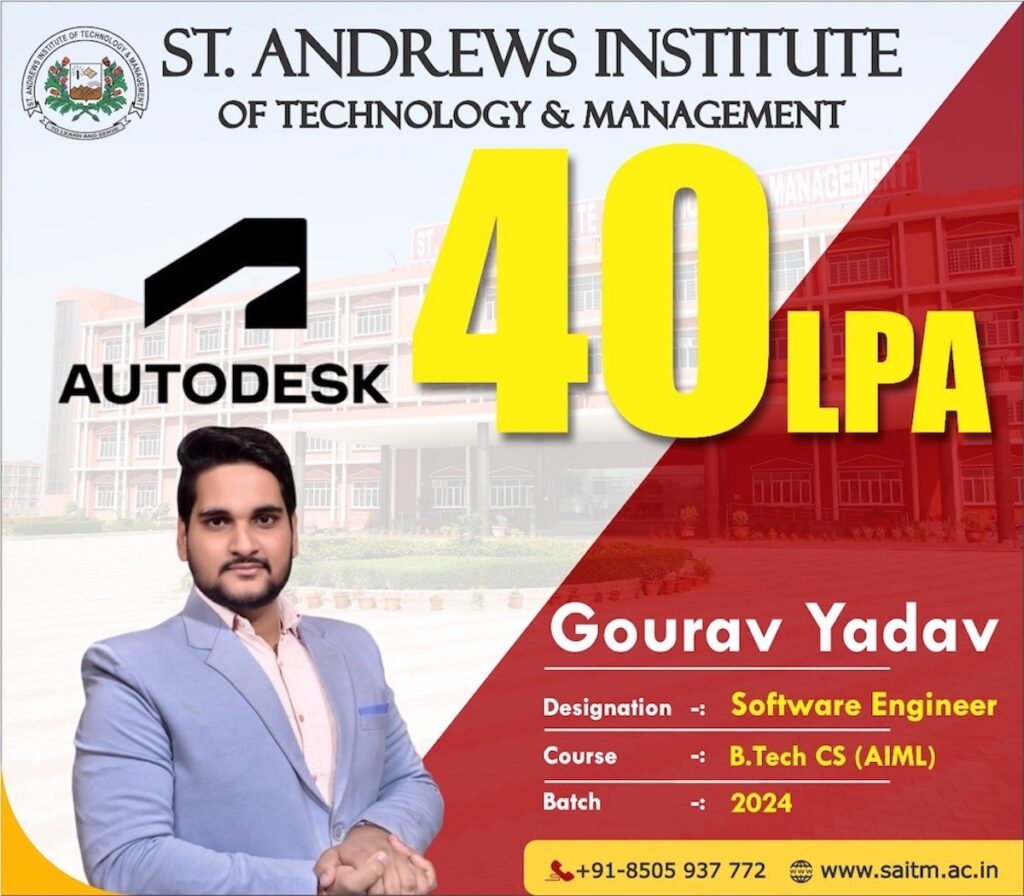
Here’s list of top MCA private colleges in India:
Vellore Institute of Technology (VIT), Vellore:
Overview: VIT is known for its strong MCA degree with excellent infrastructure and industry connections.
Key Highlights: High placement rates, modern facilities, and global exposure.
Location: Vellore, Tamil Nadu
St. Andrews Institute of Technology & Management (SAITM), Gurgaon:
Overview: SAITM offers a solid MCA degree with a focus on practical skills and industry readiness.
Key Highlights: Good placement opportunities, modern infrastructure, and industry-oriented curriculum.
Location: Gurgaon, Haryana
Christ University, Bangalore
Overview: Offers a well-regarded MCA degree focused on practical skills and industry readiness.
Key Highlights: Strong academic support, vibrant campus life, and excellent placement opportunities.
Location: Bangalore, Karnataka
Shiv Nadar University, Greater Noida
Overview: Offers a high-quality MCA course with a focus on research and innovation.
Key Highlights: Excellent faculty, strong industry links, and a focus on comprehensive education.
Location: Greater Noida, Uttar Pradesh
Jain University, Bangalore
Overview: Known for its MCA course that emphasizes practical skills and industry readiness.
Key Highlights: Strong academic support, good placement record, and a modern campus.
Location: Bangalore, Karnataka
Bharati Vidyapeeth Deemed University, Pune
Overview: Provides a well-rounded MCA curriculum with a focus on practical training and industry connections.
Key Highlights: Good infrastructure, strong placement support, and a broad curriculum.
Location: Pune, Maharashtra
Importance of Choosing the Best MCA Colleges in India
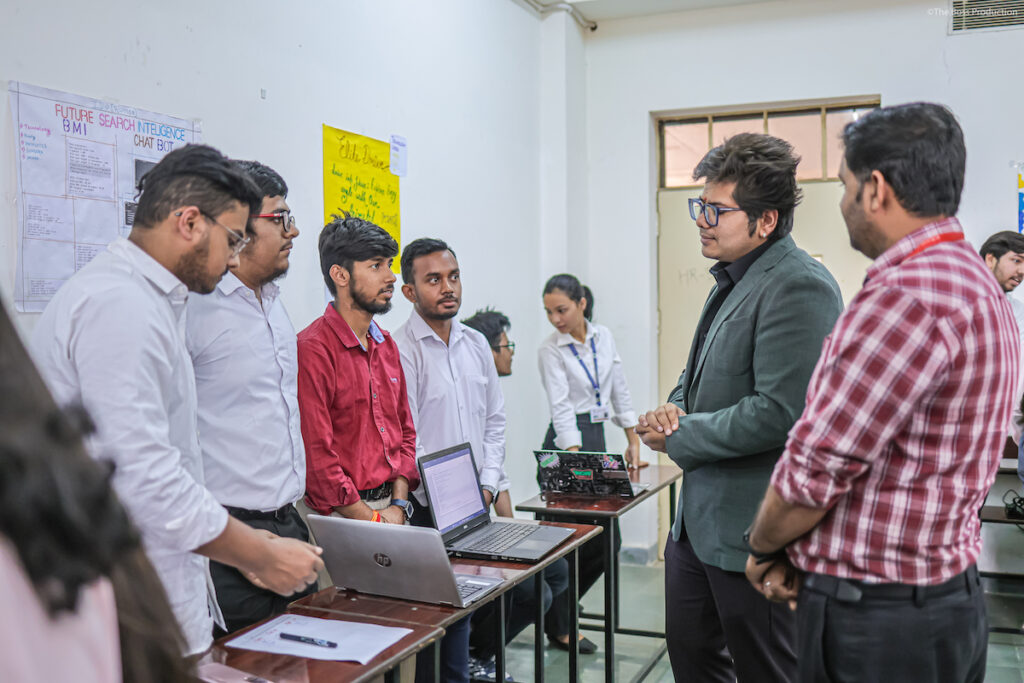
Choosing the best MCA colleges in India is crucial for several reasons.
Here’s why selecting the best MCA colleges in India matters:
Quality of Education
Curriculum: Top colleges offer a comprehensive and up-to-date curriculum that covers the latest technologies and industry practices.
Faculty: Renowned colleges have experienced faculty members who provide high-quality education and mentorship.
Career Opportunities
Placement Records: Leading MCA colleges in India often have strong placement records with high-profile companies, increasing your chances of landing a good job.
Industry Connections: Top institutions have better industry connections, providing students with internships, projects, and networking opportunities.
Infrastructure and Facilities
Modern Labs: Quality colleges are equipped with state-of-the-art laboratories and technology resources that enhance learning.
Library and Research Facilities: Access to extensive libraries and research facilities supports academic and personal growth.
Reputation and Accreditation
Institutional Reputation: A well-regarded college can enhance your resume and provide better recognition in the job market.
Accreditation: Accredited institutions ensure that the education provided meets certain standards of quality.
Peer Learning and Networking
Diverse Student Body: Top colleges attract talented and diverse students, providing a stimulating learning environment.
Networking Opportunities: Being in a prestigious college helps build a strong network of peers, alumni, and industry professionals.
Skill Development
Practical Training: Leading colleges offer practical training, projects, and workshops that improve technical skills and job readiness.
Soft Skills: They also emphasize the development of soft skills such as communication, teamwork, and problem-solving.
Higher Education and Research
Further Studies: Graduating from a top MCA college can provide a solid foundation for pursuing further studies, such as M.Tech, Ph.D., or MBA.
Research Opportunities: Quality institutions often have research programs and facilities that encourage students to engage in innovative projects.
Campus Life and Extracurriculars
Cultural Activities: Top colleges offer a vibrant campus life with various extracurricular activities, which contribute to overall development.
Student Support: Leading institutions provide comprehensive support services including counseling, career guidance, and extracurricular clubs.
Return on Investment
Financial Considerations: While top colleges may have higher fees, the return on investment in terms of education quality, career prospects, and future opportunities often justifies the cost.
Scholarships and Financial Aid: Prestigious institutions often offer scholarships, grants, or financial aid to help manage costs.
Global Exposure
International Collaborations: Leading colleges may have tie-ups with international institutions, providing students with global exposure and opportunities for international projects or exchanges.
FAQS
What factors should I consider when choosing an Best MCA colleges in India?
Consider the college’s reputation, faculty quality, infrastructure, placement opportunities, location, fee structure, and available specializations. Assessing these factors can help you choose the best fit for your career goals and personal preferences.
How can I get admission to top MCA colleges in India?
Admission to top MCA colleges in India often requires passing entrance exams such as NIMCET, GATE, or college-specific tests. Some best MCA colleges in India may also consider academic performance and personal interviews. Check each college’s admission criteria for specific details.
Are there any scholarships available for MCA students?
Yes, many top MCA colleges offer scholarships based on merit, financial need, or specific criteria. Additionally, some government and private organizations provide scholarships for higher education.
What is the typical fee range for MCA course in India?
Fees for MCA course can vary widely. Government MCA colleges may charge between ₹10,000 to ₹50,000 per year, while private colleges like chandigarh university may charge between ₹1 lakh to ₹3 lakhs per year or more, depending on the institution and location.
What are the career prospects after completing an MCA degree?
MCA graduates can pursue careers in software development, system analysis, IT consultancy, database management, network administration, and more. MCA Graduates can work in various industries including technology, finance, healthcare, and government.
What specializations are available in MCA degree?
MCA course may offer specializations such as Software Engineering, Data Science, Cybersecurity, Cloud Computing, Artificial Intelligence, and Mobile Application Development. The availability of specializations depends on the college.
How important is the college’s placement record for MCA students?
A strong placement record is crucial as it reflects the college’s ability to help students secure jobs and internships. Top colleges often have strong industry connections and a good track record of placing students in reputable companies.
Are there opportunities for internships and industry projects during the MCA course?
Many top MCA colleges offer opportunities for internships and industry projects as part of their curriculum. These experiences are valuable for gaining practical knowledge and improving employability.
What is the difference between a government and a private MCA college in India?
Government MCA colleges generally have lower fees and may offer more affordable education. Private colleges might charge higher fees but often provide modern infrastructure, specialized courses, and additional facilities. The choice depends on individual preferences and financial considerations.
Can I pursue an MCA degree through distance learning or online education?
Yes, some universities and institutes offer MCA course through distance learning or online formats. However, the quality and recognition of these programs can vary, so it’s essential to choose a reputable institution.
How can I prepare for MCA entrance exams?
To prepare for MCA entrance exams, focus on the exam syllabus, practice previous years’ question papers, and consider enrolling in preparatory courses if needed. Developing a strong foundation in mathematics, logical reasoning, and computer science fundamentals is essential.

